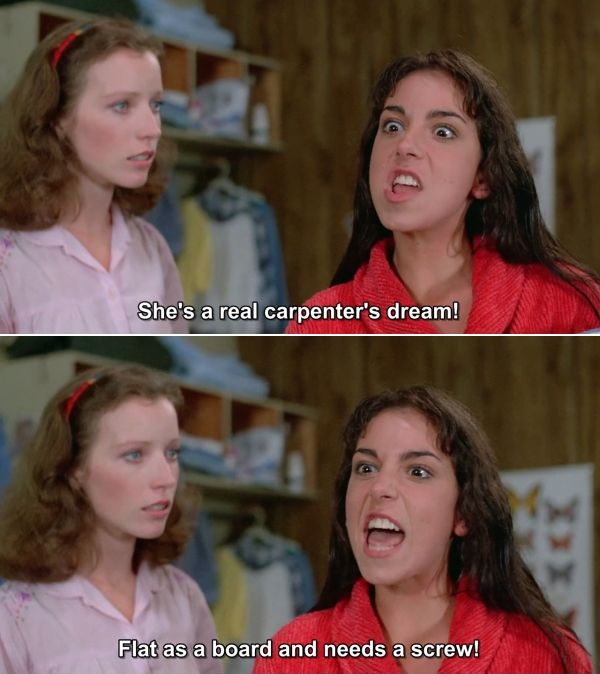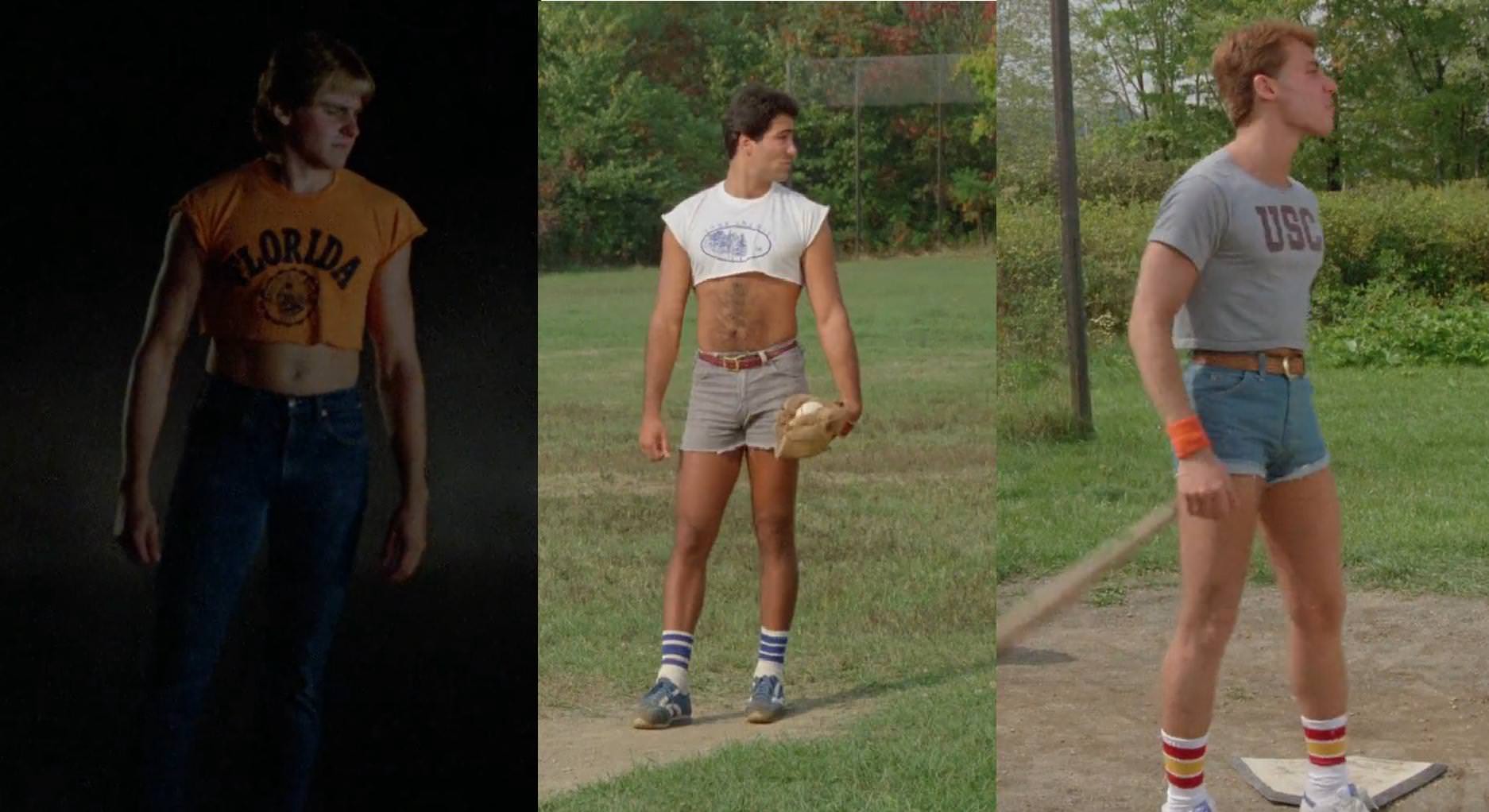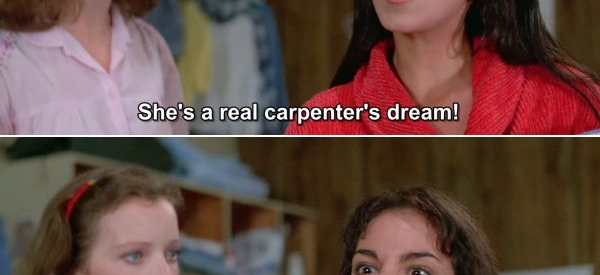
Of the many negative stereotypes that exist for trans people, perhaps none is more damning in the court of public opinion than the belief that we are dangerous. Whether physically or sexually, many people believe that trans folx, especially trans women, are predators out to harm the good-natured straight, cisgender people of the world. This mentality is what sparked the legal panic surrounding trans people using the bathrooms they identify with is rooted in, as well as the nearly infinite examples in all forms of fiction of trans women bamboozling men into having sex with them (i.e. ?traps?).
With how misguided these ideas of the trans community are, how can a film about a young, trans woman going on a murderous rampage at summer camp be one of the most gender affirming films ever released? Well, let?s take a trip down to Camp Arawak and talk about Sleepaway Camp.
Sleepaway Camp opens with John Baker and his two kids, Angela and Peter, swimming together when a boat driven by a reckless teen accidentally hits the family and kills John and one of the kids. Years later, in the summer of 1983, we see Angela has been taken in by her Aunt Martha and is being sent to camp with her cousin Ricky.
At Camp Arawak, Angela (played by the one and only Felissa Rose) is teased by the other kids for being timid and shy, most notably by her bunkmate Judy and counselor Meg. Ricky, being protective of his cousin, lashes out at any other campers who bullies Angela, even swearing that he won?t let them get away with throwing her in the lake since she has an intense fear of the water. Throughout their time at camp, a string of murders occur and camp owner Mel does his best to keep it all under wraps. However, after seeing Ricky?s outbursts, he begins to blame him for the accidents and deaths happening at camp.
All hell breaks loose one night as nearly a dozen murders are committed across camp, including Meg being stabbed in the shower, Judy being smothered with a pillow while being penetrated with a hot curling iron, and Mel being shot through the throat with an arrow after he attacked Ricky thinking he was stopping the killer.
 ?Judy had it coming!? I say as someone who is personally attacked by this line.
?Judy had it coming!? I say as someone who is personally attacked by this line.
During the climax of the film, it is revealed that Angela was the killer all along after she is confronted at the beach and is seen holding the severed head of Paul, the boy who had a crush on her all summer but had previously been caught kissing Judy. At one point (pre-death) Paul kisses Angela and this triggers a flashback where she watches her father and his partner, Lenny, cuddled in a dream scene that looks like it was filmed on the set of a public access soap opera that couldn?t actually afford a set. Not only is Angela revealed as the killer, her father is revealed to be gay.
Then, in the most famous scene in the film, the camera pulls away and we see Angela fully nude, with a penis exposed as counselor Ronnie exclaims ?My God, she?s a boy!? and then the film just sort of ends with us finding out whodunit but without any actual resolution. The villain in this slasher film isn?t killed or captured, and the credits roll over a freeze frame of Angela?s shrieking face. Angela is the killer, her father is a homosexual, and she has a penis. The end.
To say that Sleepaway Camp is problematic is an understatement. On the surface and in brief summary, this film is awful trans representation. But simply leaving it at that is only telling half the story. The significance of this film as a standard bearer for gender expression only works in hindsight and outside of the context the film was made, only visible if we violently cut this film open and take a look at the blood and guts from more than one angle.
The intended goal of this film is to get a reaction out of you. Horror ideally wants to scare, shock, or make you uneasy, and Sleepaway Camp looks to do that by exploiting homosexuality and transgender panic. The discovery of Angela?s true identity is shown through a flashback, revealing she was actually her ?dead brother? Peter all along, but was forced to live as a girl by her Aunt Martha (who I am more than a little obsessed with for the specific kind of suburban crazy she is).
There is a distinct feeling lingering over this film filled with ?they walk among us? rhetoric, in the way that ?the gays? are here to infiltrate straight spaces. At sleepovers, lock-ins, and summer camps, boys and girls are separated by their sexes to supposedly prevent all of that pre-teen, premarital nookie from taking place. But if the queers are there, then who knows what kind of trouble they could get into? Next thing you know, the girls in cabin #3 will start experimenting with each other by sticking fingers and curling irons places they don?t belong. This perceived threat to America?s youth by the ?homosexual menace? is the intended horror of Sleepaway Camp in 1983.
 On one hand it was the 80s? on the other there are a lot of skin tight, cut off shorts and exposed midriffs from the men looking after the kids. Style icons. Every-last-one-of-them.
On one hand it was the 80s? on the other there are a lot of skin tight, cut off shorts and exposed midriffs from the men looking after the kids. Style icons. Every-last-one-of-them.
But that was almost forty years ago, and immeasurable progress has been made for trans and queer perception since that time. Even in the ten years since I came out as transgender, words like ? transsexual,? which used to be the proper title for trans women, have become outdated. So how can we look back at problematic films like Sleepaway Camp and say anything other than, ?Well, that aged poorly??
Because the problem is not Angela Baker. The problem is the world and the circumstances that surrounded her.
Peter was seemingly happy living as a boy and would have not transitioned into Angela had it not been forced by Aunt Martha. This is true at least within the first film. In the sequels, much of the stuff I love about the original is retconned for the sake of creating a series, as is often the case with the slasher franchises. With that in mind I?m looking at Sleepaway Camp in a vacuum as a singular film and not as a franchise because?.that is a different, less beautiful mess entirely.
Had Angela not been forced to take on the name and identity of her dead sister (which is super fucked up at the jump), then the murders at Camp Arawak would likely never have never happened. Everyone Angela attacked was someone who had bullied, made fun of, or threatened her. Had she gone to camp as Peter, would she had been freed of all of this? Absolutely not. Junior high kids are little sociopaths and the other campers constantly shit all over each other as well, but the playful teasing would not have impacted Peter on the same level as it did Angela. Had Aunt Martha not spent years years warping Peter?s appearances and personality to what her idea of what a little girl should be like, then Angela wouldn?t have likely been so confused and quiet and been such an obvious target for bullies.
I am by no means the first person to present this defense of Sleepaway Camp. My future wife BJ Colangelo wrote about this very topic last year for Dread Central, we own multiple pieces of art and clothing for this film, and it?s one of our favorites as a couple. Saying that Angela has a special place in my heart would be an understatement, but I?m writing about this very well covered topic because nearly every take on Sleepaway Camp by trans people place her it in the ?problematic killer club? that Buffalo Bill is president of, and Angela does not belong there.
 Stop acting like Aunt Martha by turning Angela into something she isn?t!
Stop acting like Aunt Martha by turning Angela into something she isn?t!
As any fans of true crime could tell you, an unfortunately common trend in the childhoods of many murderers is that they (typically men) were forced to crossdress by their guardians. Obviously this isn?t always the case and crossdressing isn?t enough to make someone want to commit the types of crimes that would land them on true crime podcasts in the first place, but people being forced to present or live as the gender they do not identify with can cause immeasurable psychological damage that can manifest in intense feelings of shame, depression, and anger. Angela?s killing spree has real world parallels that I am pretty sure the writers lucked into.
Additionally and obviously not the same thing as serial killers, similar confusion and emotional damage is present amongst intersex individuals (those born with any combination of sex characteristics that don?t fit within the binary) who have their sex chosen for them at birth without their consent through medical genital mutilation. In too many cases, (because anything more than ZERO is too many) these doctors will make the decision of a newborn?s sex without even telling the parents that their child is intersex. This can cause many mental and emotional problems later in life.
In a backwards way to how things play out in most films, all of this makes Angela Baker a tragic example of how important gender expression is. In Angela?s brain she is Peter, but people keep calling her by a name she doesn?t want to be called and misgendering her. That is the plot of all films about transitioning but because it takes place in reverse and is attached to a ?problematic? film like Sleepaway Camp, it is discounted on all counts. That is doing a disservice to what this film has to say, whether it was the creators? intentions or not.
The framing of Sleepaway Camp presents Angela as the villain but she is no more of a villain than Frankenstein?s Monster. Angela didn?t want to be a monster, she was turned into one by everyone and everything around her. From where I sit, she is the unseen anti-hero doling out cathartic trans justice. She is cursed with a duality because there is no good way to view her as a positive character because she isn?t doing good things. At best, there are explanations for why she does what she does, but it will always be a complicated subject. You can blame the bullies and Aunt Martha as the root of Angela?s actions but at the end of the day, she was failed by the system.
Angela (the original Angela) and Peter?s father John had a partner named Lenny and they all seemed like a happy and loving family from what little we get to see of them together. When John and Angela are killed in the speedboat accident at the beginning of the film, Peter is sent to live with Aunt Martha and thus starts the series of events that leads to the murders at Camp Arawak. But this all could have been avoided if Peter had been allowed to live with Lenny.
Maybe I am over projecting some assumptions, but what I DO know is that in the 1980s there is absolutely no chance a relationship between two men would have been legally recognized in a way that would have given one?s partner custody in the event of the other?s passing.
In its own way, Angela Baker?s actions almost play out like a different sub-genre known for it?s exploitative nature? rape revenge films. That comparison immediately adds a new, even more divisive layer to this movie, but I think it?s an important one to make. Angela only kills people who hurt her and while I can?t say I want to casually go a-killin?, this is a very cathartic thing for me to see as a trans woman.
In Trump?s America, bigots have never been more emboldened to be bigots and living in a swing state, I am constantly confronted by the question of whether I can ?let them win?. Do I go up and say something in response to their behavior or is it unsafe to do so in that moment? Doing nothing means they will keep doing it but fighting with them likely isn?t going to change their minds and could put me and my partner in danger.
There is no universal answer for every situation, but wouldn?t it be so much nicer and easier if there was? Bad things happening to bad people. Child molesters get scalding water poured on their face, a grown man who beats the shit out of your cousin gets an arrow in the neck, the boy who cheated on you gets decapitated, and everyone who ever mocked you gets a wild variety of murders.
(For what it?s worth, my favorite is ?death by bees in the bathroom.?)
Happy Women in Horror Recognition Month!


